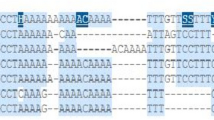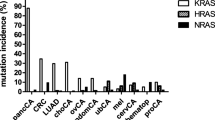Abstract
Background
DNA repair plays an important role in chemoresistance to platinum-based therapy, and therefore polymorphisms in the genes may modulate therapeutic response. We assessed 12 polymorphisms in 7 DNA repair genes and 2 polymorphisms in the MTHFR gene for association with disease response and prognosis.
Methods
A total of 258 patients included in the study had adenocarcinoma of the esophagus (n = 114) or gastric cancer (n = 144), at stage cT3/4 and cM0, and had been treated with platinum-based neoadjuvant polychemotherapy. The patients were genotyped for polymorphisms in the XPC, XPD, XPG, APEX, XRCC1, NBS1, XRCC3, and MTHFR genes by the allelic discrimination method and the data correlated with various clinical parameters.
Results
None of the investigated polymorphisms was associated with histopathological response. XRCC3 polymorphisms rs861539 (P = 0.02) and rs861530 (P = 0.05) showed association with clinical response in gastric cancer. The variants in XRCC3 (rs861539, P = 0.05; rs1799794, P = 0.03) and MTHFR (rs1801131, P = 0.02) were associated with survival in esophageal and gastric cancer, respectively. In R0 resected patients, XRCC3 variants (rs861539, P = 0.04; rs861530, P = 0.02) in esophageal cancer, and XRCC3 (rs1799794, P = 0.02) and MTHFR (rs1801131, P = 0.005) in gastric cancer predicted survival. Cox regression revealed ypT category (P = 0.001) and lymphatic vessel invasion (P = 0.03) to be independent prognostic factors for esophageal cancer, and histopathological response (P = 0.01), MTHFR variant (rs1801131, P = 0.002), and ypN category (P = 0.02) to be prognostic factors for gastric cancer.
Conclusion
In gastric cancer patients, MTHFR variant (rs1801131) could serve as a potential prognostic marker. In esophageal cancer patients, none of the polymorphisms studied had conclusive results in multivariate analysis, although XRCC3 variant (rs861539) showed an effect on survival in Kaplan–Meier univariate analysis.

Similar content being viewed by others
References
Allum WH, Stenning SP, Bancewicz J, Clark PI, Langley RE. Long-term results of a randomized trial of surgery with or without preoperative chemotherapy in esophageal cancer. J Clin Oncol. 2009;27:5062–7.
Boige V, Pignon J, Saint-Aubert B, et al. Final results of a randomized trial comparing preoperative 5-fluorouracil (F)/cisplatin (P) to surgery alone in adenocarcinoma of stomach and lower esophagus (ASLE): FNLCC ACCORD07-FFCD 9703 trial. J Clin Oncol. 2007;25(18 Suppl):4510.
Cunningham D, Allum WH, Stenning SP, et al. Perioperative chemotherapy versus surgery alone for resectable gastroesophageal cancer. N Engl J Med. 2006;355:11–20.
Kelsen DP, Winter KA, Gunderson LL, et al. Long-term results of RTOG trial 8911 (USA Intergroup 113): a random assignment trial comparison of chemotherapy followed by surgery compared with surgery alone for esophageal cancer. J Clin Oncol. 2007;25:3719–25.
Lowy AM, Mansfield PF, Leach SD, Pazdur R, Dumas P, Ajani JA. Response to neoadjuvant chemotherapy best predicts survival after curative resection of gastric cancer. Ann Surg. 1999;229:303–8.
Lordick F, Ott K, Krause BJ, et al. PET to assess early metabolic response and to guide treatment of adenocarcinoma of the oesophagogastric junction: the MUNICON phase II trial. Lancet Oncol. 2007;8:797–805.
Bradbury PA, Kulke MH, Heist RS, et al. Cisplatin pharmacogenetics, DNA repair polymorphisms, and esophageal cancer outcomes. Pharmacogenet Genomics. 2009;19:613–25.
Bradbury PA, Zhai R, Hopkins J, et al. Matrix metalloproteinase 1, 3 and 12 polymorphisms and esophageal adenocarcinoma risk and prognosis. Carcinogenesis. 2009;30:793–8.
Bradbury PA, Zhai R, Ma C, et al. Vascular endothelial growth factor polymorphisms and esophageal cancer prognosis. Clin Cancer Res. 2009;15:4680–5.
Cescon DW, Bradbury PA, Asomaning K, et al. p53 Arg72Pro and MDM2 T309G polymorphisms, histology, and esophageal cancer prognosis. Clin Cancer Res. 2009;15:3103–9.
Ott K, Lordick F, Becker K, et al. Glutathione-S-transferase P1, T1 and M1 genetic polymorphisms in neoadjuvant-treated locally advanced gastric cancer: GSTM1-present genotype is associated with better prognosis in completely resected patients. Int J Colorectal Dis. 2008;23:773–82.
Ott K, Vogelsang H, Marton N, et al. The thymidylate synthase tandem repeat promoter polymorphism: a predictor for tumor-related survival in neoadjuvant treated locally advanced gastric cancer. Int J Cancer. 2006;119:2885–94.
Warnecke-Eberz U, Vallbohmer D, Alakus H, et al. ERCC1 and XRCC1 gene polymorphisms predict response to neoadjuvant radiochemotherapy in esophageal cancer. J Gastrointest Surg. 2009;13:1411–21.
Wu X, Gu J, Wu TT, et al. Genetic variations in radiation and chemotherapy drug action pathways predict clinical outcomes in esophageal cancer. J Clin Oncol. 2006;24:3789–98.
Bachmann K, Shahmiri S, Kaifi J, et al. Polymorphism Arg290Arg in esophageal-cancer-related gene 1 (ECRG1) is a prognostic factor for survival in esophageal cancer. J Gastrointest Surg. 2009;13:181–7.
Hildebrandt MA, Yang H, Hung MC, et al. Genetic variations in the PI3 K/PTEN/AKT/mTOR pathway are associated with clinical outcomes in esophageal cancer patients treated with chemoradiotherapy. J Clin Oncol. 2009;27:857–71.
De Mattia E, Toffoli G. C677T and A1298C MTHFR polymorphisms, a challenge for antifolate and fluoropyrimidine-based therapy personalisation. Eur J Cancer. 2009;45:1333–51.
Etienne-Grimaldi MC, Francoual M, Formento JL, Milano G. Methylenetetrahydrofolate reductase (MTHFR) variants and fluorouracil-based treatments in colorectal cancer. Pharmacogenomics. 2007;8:1561–6.
Bader FG, Lordick F, Fink U, et al. Paclitaxel in the neoadjuvant treatment for adeno carcinoma of the distal esophagus (AEG I). A comparison of two phase II trials with long-term follow-up. Onkologie. 2008;31:366–72.
Ott K, Sendler A, Becker K, et al. Neoadjuvant chemotherapy with cisplatin, 5-FU, and leucovorin (PLF) in locally advanced gastric cancer: a prospective phase II study. Gastric Cancer. 2003;6:159–67.
Ott K, Bader FG, Lordick F, Feith M, Bartels H, Siewert JR. Surgical factors influence the outcome after Ivor-Lewis esophagectomy with intrathoracic anastomosis for adenocarcinoma of the esophagogastric junction: a consecutive series of 240 patients at an experienced center. Ann Surg Oncol. 2009;16:1017–25.
Ott K, Fink U, Becker K, et al. Prediction of response to preoperative chemotherapy in gastric carcinoma by metabolic imaging: results of a prospective trial. J Clin Oncol. 2003;21:4604–10.
Ott K, Herrmann K, Lordick F, et al. Early metabolic response evaluation by fluorine-18 fluorodeoxyglucose positron emission tomography allows in vivo testing of chemosensitivity in gastric cancer: long-term results of a prospective study. Clin Cancer Res. 2008;14:2012–8.
Ott K, Weber WA, Lordick F, et al. Metabolic imaging predicts response, survival, and recurrence in adenocarcinomas of the esophagogastric junction. J Clin Oncol. 2006;24:4692–8.
Weber WA, Ott K, Becker K, et al. Prediction of response to preoperative chemotherapy in adenocarcinomas of the esophagogastric junction by metabolic imaging. J Clin Oncol. 2001;19:3058–65.
Becker K, Mueller JD, Schulmacher C, et al. Histomorphology and grading of regression in gastric carcinoma treated with neoadjuvant chemotherapy. Cancer. 2003;98:1521–30.
Figl A, Scherer D, Nagore E, et al. Single-nucleotide polymorphisms in DNA-repair genes and cutaneous melanoma. Mutat Res. 2010;702:8–16.
Schneider PM, Baldus SE, Metzger R, et al. Histomorphologic tumor regression and lymph node metastases determine prognosis following neoadjuvant radiochemotherapy for esophageal cancer: implications for response classification. Ann Surg. 2005;242:684–92.
Rohatgi P, Swisher SG, Correa AM, et al. Characterization of pathologic complete response after preoperative chemoradiotherapy in carcinoma of the esophagus and outcome after pathologic complete response. Cancer. 2005;104:2365–72.
Huang ZH, Hua D, Li LH. The polymorphisms of TS and MTHFR predict survival of gastric cancer patients treated with fluorouracil-based adjuvant chemotherapy in Chinese population. Cancer Chemother Pharmacol. 2009;63:911–8.
Font A, Salazar R, Maurel J, et al. Cisplatin plus weekly CPT-11/docetaxel in advanced esophagogastric cancer: a phase I study with pharmacogenetic assessment of XPD, XRCC3 and UGT1A1 polymorphisms. Cancer Chemother Pharmacol. 2008;62:1075–83.
Author information
Authors and Affiliations
Corresponding author
Additional information
The first two authors contributed equally to this work.
Electronic supplementary material
Below is the link to the electronic supplementary material.
Rights and permissions
About this article
Cite this article
Ott, K., Rachakonda, P.S., Panzram, B. et al. DNA Repair Gene and MTHFR Gene Polymorphisms as Prognostic Markers in Locally Advanced Adenocarcinoma of the Esophagus or Stomach Treated with Cisplatin and 5-Fluorouracil-Based Neoadjuvant Chemotherapy. Ann Surg Oncol 18, 2688–2698 (2011). https://doi.org/10.1245/s10434-011-1601-y
Received:
Published:
Issue Date:
DOI: https://doi.org/10.1245/s10434-011-1601-y




